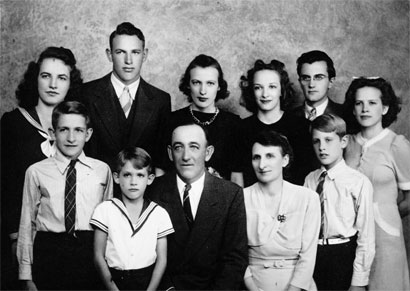2006 IN REVIEW: Help wanted! Genetic counselors

This photo of the Bradfield family, taken Sept. 20, 1942, includes (front row) Phil and Warren; their parents Loren and Golda, and Larry, another son. In the back row are five more of the couple’s children: Dorothy; Don; Becky; Betty and her husband Bob Allen, and Eula. Seven of those pictured died of stomach cancer. Those that did not die from the cancer include Loren, the father who never carried the gene; Warren; Bob, and Don, who died of a heart attack but passed the gene for the cancer on to his children.

Six of the Bradfield cousins gathered for a mini-reunion at Stanford on Feb. 13, 2005, the day before two of them, Mike Slabaugh (far left) and Mark Allen (far right), had surgery to remove their stomachs. Three of the others had already had the operation, known as a gastrectomy, at Stanford, with one other having the procedure at the University of Washington. All six, as well as five others not shown, had tested positive for a gene that often leads to the disease and had chosen to have the operation before the cancer could be detected.
A little knowledge can be a dangerous thing. Just ask Golda Bradfield's descendants. All they had to do was look at the family photo from 1942 and the toll that stomach cancer had taken would hit them like a brick. Not only did the disease kill Golda, but also six of her eight children.
When one of Golda's grandchildren died of stomach cancer in 1960, the remaining grandchildren concluded, rightfully, that the condition was genetic. What to do about it was another matter.
"I felt like this big cloud was hovering over me since I was 13, when my mother was diagnosed," said one of Golda's grandsons, Mike Slabaugh, whose concerns about cancer kept him from marrying or having children of his own.
But sometimes a little more knowledge can make a dangerous thing less dangerous.
In 2003, it became possible to detect the responsible gene, and the 17 cousins turned for advice to what has become an increasingly necessary medical specialty: genetic counseling. "Internists are not trained to do complex genetics," said James Ford, MD, assistant professor of medicine and director of the Stanford Cancer Genetics Clinic. "We need people to interpret the information."
There's a growing demand for people who can translate genetics into English, and a national effort is under way to increase the number of genetic counselors. The School of Medicine, for instance, announced in July that it was launching a new master's degree program in genetic counseling—a collaboration between the departments of genetics and pediatrics. Louanne Hudgins, MD, Lucile Packard Children's Hospital's director of perinatal genetics, will serve as medical director of the two-year program, which in the fall of 2007 will begin training six new counselors each year.
In the case of Slabaugh and his cousins, the information they received from the genetic counselors at Stanford and elsewhere was life saving. After learning that those with the gene ran a 70-80 percent chance of developing stomach cancer, all 11 of the cousins who tested positive chose to have their stomachs removed. Six of them had the operation at Stanford.
Although the procedure was drastic (many people who have inherited a predisposition to certain conditions can get by with more frequent or more thorough screenings), it was the correct one for this family. When the physicians examined removed tissue, they found that nine of the cousins had already developed potentially fatal early tumors that screens failed to detect.
"Now, when I wake up in the morning," said Slabaugh, "it's a day I wouldn't have had."

Share This Story